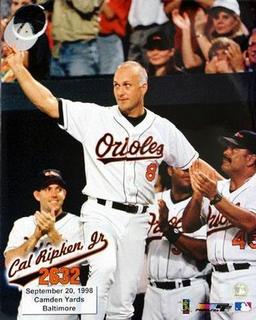Steroids, Baseball and Cheating

I just caught part of the Morning Edition (WYPR-Baltimore) report on Cal Ripken Jr.'s discussion of steroids and baseball with little leaguers. During the interview, I was reminded how much I admire Cal Ripken Jr., and consider him an ideal sports legend. Ripken Jr. reports that he engaged the little leaguers in dialogue about steroids and even Oriole Rafael Palmeiro until he felt satisfied that they understood that taking steroids was cheating.
The issue of steroids in baseball is close, believe it or not, to my own interest in the ethics of enhancement technology (I wrote about this back in June, see here). Many times when I give talks on the ethics of cosmetic psychopharmacology, I make an analogy to steroid use in baseball or to taking growth hormone to better compete in Basketball. I usually make this move to see if it engages peoples' sense of fair play--is taking a drug for competitive advantage cheating?
While I was in CA, I got into a conversation with Drew and Jack about this topic. Jack was pretty uninterested in the topic and thought it distracted from more serious news. Drew thought that moral condemnation of steroid use was ridiculous, since baseball is really about entertainment. Fans, Drew argued, want to see lots of home runs and power hitters.
I think many agree with Drew, but I am heartened that Ripken doesn't, and that he wants to reinforce the notion that steroid use is cheating among young children. We admire Ripken precisely because he represents everything that we hold dear as Americans: hard work, determination, moral character are the ingredients for success in life. Ripken Jr. is also a philanthropist, who cares about giving back to his community.
There are at least two interesting moral questions tied up with steroid use in baseball: (1) Is steroid use cheating? and (2) Does widespread steroid use in baseball ultimately lead to coercion? My intuition about the first question is yes. However, interestingly, I don't have as strong of a moral intuition that taking SSRI drugs (Prozac/Zoloft/Paxil) is cheating. I find this puzzling.
The second question is a lot more complicated. Coercion means that our autonomy is being violated, that is, we are being prevented from choosing our own ends. If we are coerced, then it is difficult to assign moral blame. Now, clearly no one is holding a gun to the heads of MLB players. They can choose to take steroids or not. However, if everyone or almost everyone takes steroids, then it becomes a sort of prerequisite for anyone interested in playing MLB to take them. I am not sure what to make of this outcome. But, if baseball goes this direction, then it is hard to hold it dear as the all-American sport. Unless, what we mean by all-American is better living through technology.
I disagree with Drew and Jack on the importance of these steroid stories. I think the ethical issues bound up with steroid use in athletics is really important and will say a lot about what we do really value as a country: e.g. whether we think sports are mere entertainment, and not a contest, or that technological enhancements are fair game to increasing one's competive advantage.


|